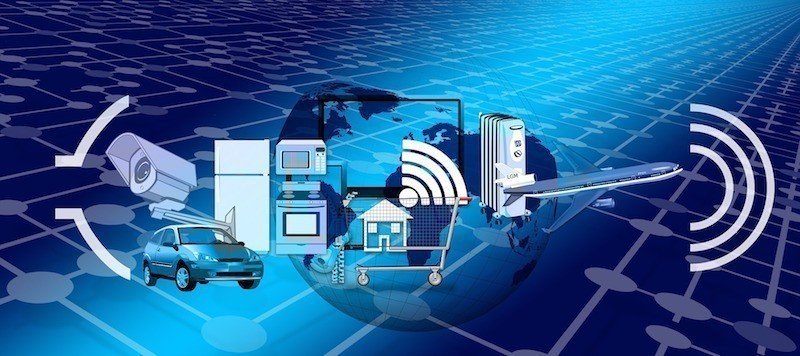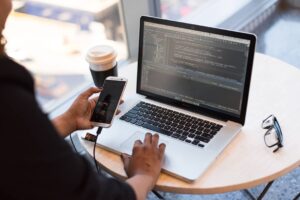The hottest trend in technology today is the blockchain. Originally developed as the foundation on which bitcoin was built, blockchain technology has much more to offer than just as a mechanism for digital currencies. Many aspects of our lives—everything from trading stocks to casting ballots—could be transformed by the blockchain in the near future. Government organizations and companies large and small are all scrambling to be among the first to unlock the potential benefits of blockchain technology.
What is the Blockchain?
The blockchain was originally devised as the foundational technology of the digital currency bitcoin. It is essentially a digital ledger of transactions that is distributed across a peer-to-peer network. When a new transaction takes place, the ledger is updated in each copy across the entire network. Each block in the chain contains a timestamp and a reference to a previous block. All events are visible to the public and stored in the blockchain in a permanent record that can’t be retroactively altered.
Because it exists as a distributed database rather than a centralized one, the blockchain is almost impossible to corrupt. This is because a majority of nodes must be in agreement to validate the record of digital events. An alteration to the ledger on a single copy of the blockchain will be rejected by the rest of the system.
The blockchain keeps an open and transparent permanent record of transactions. This makes it ideal for storing a record of digital currency transactions in a way that is highly secure and verifiable. However, since any event can be recorded on the ledger, there are many other exciting possible use cases in both the public and private sectors.
Improving KYC Checks
In the financial sector, digital identities stored in the blockchain could be used to speed up verification for KYC (know your customer) checks. A wide range of activities—everything from setting up bank accounts to applying for auto loans—could be sped up and made more accurate.
Reducing Corruption
One exciting possibility for use of the blockchain involves using it to verify the distribution of government subsidies in order to eliminate corruption. Currently, in developing countries, many resources intended for the poor end up going through the hands of middlemen who make illegal profit from their distribution. The blockchain could be used to verify and guarantee that the goods are distributed only to their rightful recipients.
Reducing Costs of Stock Trading
Currently, up to 10% of stock trades involve various types of human errors. These require manual intervention to fix, slowing the process down considerably. Blockchain technology could be used to make trading more efficient, especially in the clearing and settlement phases. It’s estimated that this could save billions of dollars per year.
Allowing Private Homes to Generate and Sell Electricity
Rather than having electricity originate from a central authority, individual citizens can generate their own electricity with home-based solar panels. Homes that generate surplus electricity could sell it across a network that all homes are connected to, and these transactions could be managed and recorded by the blockchain.
Establishing Trust on Sharing Platforms Such as Airbnb
Online identities for sharing platforms such as Airbnb could be stored on the blockchain. Unlike using Facebook or other social media profiles that can be deleted and re-created for account sign-up, the blockchain record is permanent. Since your ID can’t be tampered with, review scores would carry more validity and trust.
Voting
If combined with a digitized national ID system that made use of biometric data, the blockchain could be used to eliminate voter fraud. Votes could be cast online via a smartphone app that requires second-factor authentication with biometric data such as a fingerprint, iris scan, voice recognition, or facial recognition. As a record of the vote is kept on the blockchain, it eliminates the possibility of a duplicate vote being cast by that individual.
Speeding Up Real Estate Sales
Currently, property ownership is manually verified during the sale process. This ends up being a drain on manpower and is error-prone to boot. Verification of land title ownership via the blockchain could greatly increase the speed of property transactions.
Smart Contracts
The ability to program smart contracts onto the blockchain allows autonomous execution of transactions. One application of smart contracts would be in order to budget and distribute funds in a corporation. For example, you could program the system to automatically divert 10% of profits to Research and Development or 5% for employee end-of-year bonuses.
Intellectual Property Protection
The blockchain can be used to protect intellectual property rights by providing a verifiable record of the first appearance of intellectual property. It can also be used as a distribution mechanism to give artists, such as musicians, an alternative marketplace.
Changing the Insurance Industry
Blockchain technology has the potential to revolutionize the insurance industry. US-based consumers are especially tired of paying high insurance premiums to companies run by CEOs getting multi-million dollar annual bonuses. Peer-to-peer insurance networks built on the blockchain would eliminate the overhead costs associated with traditional insurance companies. This would be a huge win for the average Joe, though a loss for a handful of millionaires.
Managing the Internet of Things
The “internet of things” is a term used to describe network controlled electronic devices. This could include everything from drink vending machines to security cameras to pizza delivery drones. Smart contracts will allow the operation of these systems to become fully automated. For example, the vending machine could automatically place an order to restock itself when it runs out of a particular item.

Blockchain Development with Iglu
Iglu has a good head start in the development of blockchain technology. We have worked with bittunes, an independent digital music market using the blockchain. Iglu is also working with a government agency to develop a blockchain-based system that will reduce corruption and benefit thousands of people involved in a major national industry. Do you have a groundbreaking idea that involves the use of blockchain technology? You can discuss outsourcing your blockchain development with Iglu. To get the conversation started, simply fill out our contact form.






